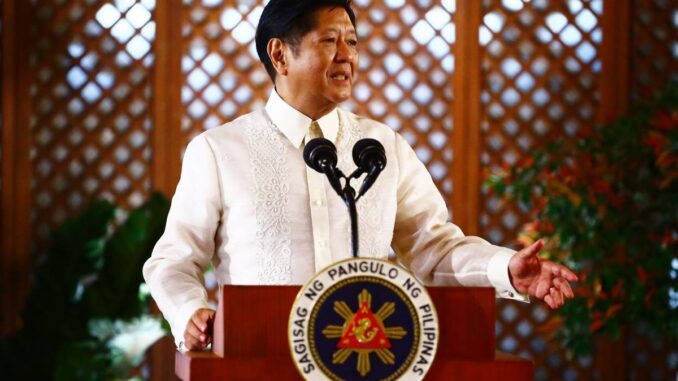
(UPDATE) PRESIDENT Ferdinand Marcos Jr. is set to veto certain items and provisions of the 2025 General Appropriations Act (GAA) “in the interest of public welfare, to conform with the fiscal program, and in compliance with laws,” Malacañang said Wednesday.
Executive Secretary Lucas Bersamin issued the statement following budget cuts in the Department of Education (DepEd) and the Philippine Health Insurance Corp.
“The scheduled signing of the General Appropriations Act on Dec. 20 will not push through to allow more time for a rigorous and exhaustive review of a measure that will determine the course of the nation for the next year,” Bersamin said.
President Ferdinand Marcos Jr. PHOTOS BY MIKE ALQUINTO
He said Marcos was personally leading the ongoing assessment of the proposed 2025 budget, in consultation with the heads of major departments.
“While we cannot yet announce the date of the signing, we can now confirm that certain items and provisions of the national budget bill will be vetoed in the interest of public welfare, to conform with the fiscal program, and in compliance with laws,” he added.
On Dec. 11, the bicameral conference committee approved the final version of House Bill 10800, or the proposed P6.352-trillion national budget for next year.
Some lawmakers, including the president’s older sister, Sen. Imee Marcos, have appealed for a thorough review of the proposed 2025 budget.
Senator Marcos expressed willingness to work through the holidays to address any issues surrounding specific items in the national spending plan.
Early this week, the president defended the significant increase in the proposed budget of the Department of Public Works and Highways (DPWH), saying the government must spend for the safety of the people.
The proposed DPWH budget bloated to P1.113 trillion from the initial P900 billion after the bicameral conference committee meeting.
“But public works is still going to be one of the top recipients of budget because we are doing many things,” Marcos said in a media interview in Malacañang on Monday.
“We have big projects that we have to put in place. Infrastructure is important. And don’t forget flood control became such a big, big part of the work of the DPWH,” he added.
On the other hand, the president said they were working to restore the P10-billion cut in the proposed budget for the DepEd.
He said the budget cut contradicted his administration’s policy direction regarding science, technology, engineering and mathematics.
“I think we’ll still be able to do it, to be able to do something. Maybe this is the first thing, my answer is not complete yet, but I will say now that we are working on it,” Marcos said.
“[T]he original request of the P12 billion to be reduced down to two… P12 billion is only sufficient to maintain what we’re already doing when, in fact, we have to do more,” he added.
Marcos said he would strive to sign the 2025 GAA before Christmas.
The president has the power to veto or set conditions for the implementation of certain items in the enacted national budget but cannot add new items or bring back items already removed by Congress.
Last year, Marcos vetoed sections of the 2024 GAA pertaining to the Department of Justice (DOJ) revolving fund and to the implementation of the national government’s career executive service development program.
In his veto message last year, Marcos rejected the “DOJ Revolving Fund,” saying, “there is no law which authorizes the DOJ to establish a revolving fund for the purpose indicated.”
Senate President Francis Escudero and Senate Committee on Finance chairman Sen. Grace Poe said the president’s decision to delay the signing of the 2025 budget bill was a part of the checks and balances involved in the budgetary process established by the Constitution.
Escudero emphasized that the chief executive’s prerogative and right are to review, study and line-item veto the national budget before it is finally approved and signed.
He noted that this process occurs annually with the general appropriations bill, mainly because the national budget is lengthy, complex and contains numerous details.
Poe said the president’s delay in signing the budget demonstrated a healthy democracy, as the president holds the power to review, approve or veto the proposed General Appropriations Act.
She said his economic managers could provide President Marcos with the best advice regarding the state of the national funds.
”The GAA is the most important piece of legislation that can determine our economic stability and our GDP (gross domestic product) growth in 2025,” she added.
Sen. Aquilino Pimentel III said the president has the authority to assess the budget and approve or veto the proposed budget.
WITH REINA C. TOLENTINO AND BERNADETTE E. TAMAYO





Be the first to comment